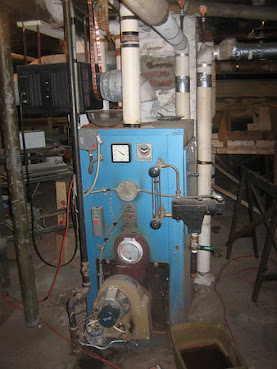It’s Fall, Time to Wake the Boilers
As HVAC professionals begin getting their sleepy boilers ready for the upcoming heating season, they know that the first few weeks of heating season can be hectic, as dormant boilers are lit and unexpected startup problems pop up all over. It’s typically a time with some long days and a steady stream of calls from residents and building operators.
Professionals who’ve been doing this for a while, know that even if a boiler has been professionally inspected and serviced during the summer months, idle heating systems are still susceptible to both sediment and corrosion. Sediment settles out of the cold motionless water and compacts in pumps and valves, and of course as Mr. Young famously said, “rust never sleeps.”
The physics of heating system inactivity conspires to create a rich set of winter startup problems for commercial heating professionals. As a premiere manufacturer of advanced heating control systems, the experts at Heat-Timer® have seen their share of these startup problems, and taught building managers a few tricks for using our controls and room sensors to diagnose these issues.
1. Preventing Pump Problems. Because of this summer’s accumulation of sediment and rust, pumps are one of the first things that a technician checks when they turn on the boiler. Often a pump won’t start because the impeller is embedded in sediment. If the pump does start, it may leak through dried out seals. This often leads to a pump disassembly, cleaning and rebuild, or full pump replacement.
This expensive fall pump ritual can be prevented with a little exercise. A pump lead lag controller like the Heat-Timer® PLL can exercise boiler pumps by running them for a short period every week during the off-season, keeping seals wet and flushing out sediment. The Heat Timer® PLL also has low flow alarms which when interfaced to a Platinum series controller, can alert the boiler service company or building manager that there is a pump failure at any time during the heating season. Often these problems can be diagnosed and resolved without a visit to the boiler room, thanks to our BuildingNet® interface or mobile phone app.
2. Oil Fired Boilers – For oil fired boilers, clogged fuel filters can be another start-up problem as a summer’s accumulation of black sludge is stirred up and sucked into the filter when the oil tank is filled in the fall. This can cause hard to diagnose boiler lockouts as the burner is intermittently starved for fuel unless that oil filter is monitored with a vacuum sensor like Heat Timer’s Oil Filter Monitoring Kit. An oil filter monitor connected to a Platinum controller can give a building manager plenty of warning that a fuel filter needs to be replaced, so that it can be changed at the next regular boiler service, rather than during a late-night emergency call after a boiler lock-out.
3. Plumbing Decay – While pumps and filters are the obvious problem areas during boiler start up because they are right there out in the open, there are invisible problems in the boiler room too. Pipes, condensate tanks and the boilers are eternally and invisibly rusting from the inside out. Boiler tube leaks are common start-up problems on older boilers. Iron pipes can suddenly develop pinhole leaks. Steam traps can fail to close properly. Even when these leaks are as obvious as a puddle on the floor, it can be days before someone goes into the boiler room and notices it. On the other hand a leak from a steam line or steam trap can be hard to see even if a service technician is looking for it, and water leaking from inside the boiler may evaporate and go up the stack, but not before causing further corrosion problems in the burner and the flue ducting.
Fortunately, the days (and nights) of discovering water leaks only after the sump pump alarm goes off are long gone. Sensitive boiler feedwater meters connected to BuildingNet® through a Platinum controller continuously measure boiler make-up water usage. Building managers can use BuildingNet’s trending tools to visualize long term changes in boiler water usage week to week or season to season, helping identify water leaks while they are still small and inexpensive to fix rather than after they have flooded the boiler room, shutting down the boiler and damaging equipment.
Heat-Timer® Controls Save Money and Maintenance Headaches
There is a lot to keep an eye on in those first few weeks of boiler operation, especially if you are responsible for multiple buildings. Knowing that your boiler controller has your back, monitoring everything going on in the boiler room can make waking up the boilers a lot less stressful. Heat-Timer® has been helping boiler service professionals wake up the boilers for over 80 years with a deep toolkit of controllers, sensors and alarms.
If waking up the boilers is keeping you awake at night,
consider upgrading to Heat-Timer’s
Platinum controller with a BuildingNet® remote interface.
Original content posted on https://www.heat-timer.com/its-fall-time-to-wake-the-boilers/




Comments
Post a Comment